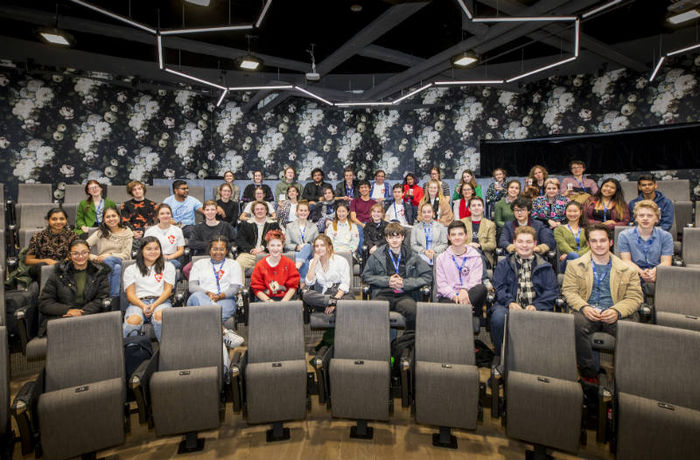MAJOR HACK
In light of the emerging COVID-19 situation and continuing policy statements from the State and Federal Government, the University is adopting a series of changes to reduce rates of infection in the community. The health and wellbeing of our community is of paramount importance.
Therefore, MAJOR HACK 2020 has been cancelled. Thank you for your understanding as we endeavour to keep our community members safe during this uncertain time. More information.
You've heard of a tech hackathon – but what about a humanities hackathon? MAJOR HACK is a hackathon for the humanities and social sciences for students interested in the Bachelor of Arts.
MAJOR HACK: a hackathon for the humanities
Hacking and hackathons were once the domain of technology, designers and programmers. But at the Faculty of Arts at the University of Melbourne, MAJOR HACK brings the hackathon to the humanities and social sciences in a two-day, cross-disciplinary event for current Year 11 and 12 students.
Join 100 of your fellow students on our Parkville campus to solve a problem through the lens of a wide range majors in the Bachelor of Arts.
Register your interest for 2021
MAJOR HACK 2020 has been cancelled, but you can still register your interest for 2021. Sign up now to receive updates and exclusive content.
Register your interestMAJOR HACK 2019: Shakespeare meets social media
At MAJOR HACK 2019, Year 11 and 12 students developed innovative narratives in response to a provocation drawn from William Shakespeare's influential play, Julius Caesar.
After a day of lectures learning about Shakespeare's play, source texts, political communications, fake news and Roman society, our hackers were asked to pick a side – Caesar or the conspirators – and develop a communications plan in the wake of Caesar's assasination.

MAJOR HACK 2019 winners
The winning team from MAJOR HACK 2019 were asked to respond to the final line of Julius Caesar for a chance to win one of three grand prizes. View the winning submissions below, and congratulations to our three winners!
-
First place: Mehul
-
Second place: Clare
-
Third place: Elisa
Explanation
For my provocation, I chose the side of Mark Antony because of his position in the public arena as a supporter of Caesar as well as an individual politician. Compared to Octavius, Antony has a stronger foundation to work off of, as he is already a prominent political figure as well as more closely resembling politicians of today, which is the era my response is appropriate to.
The form, a series of tweets, intends to emulate how Donald Trump spreads his messages so they resemble his tweets in style. His use of Twitter in comparison to any other social media platform means that he must keep his messages concise and carefully crafted due to the character limit. Regardless of how I feel about his ideology, it is undeniable that Trump is a powerful communicator. After some research into how he speaks and writes, it became clear that the reason for his popularity is that his speech and writing is accessible to a wide range of people because it is usually in short sentences that often end in strong memorable words. He doesn’t leave any space for ambiguity with regards to how the reader should feel as he’s expressive with his use of exclamation marks and emotive yet simple language.
There are some unquestionable similarities between Mark Antony and Donald Trump in terms of their manipulation of the public, and even direct links such as that between Antony’s speech at Caesar’s funeral and Trump’s victory speech in Nevada wherein he claimed to “love the poorly educated”. They both have similar strategies of controlling what the public thinks of them as well as others, especially their opponents whom they often alienate and vilify. It therefore follows that if Antony were to exist in a time when Twitter is around and has an account, his tweets would be of similar nature to Trump’s.
However, unlike the majority of Trump’s tweets, these are not defensive as that is not appropriate in the given situation. Instead, they aim to unite the public in their aversion to the conspirators by inciting feelings of anger and frustration for the suffering that they have made the Roman society endure. The ultimate aim of the tweets, however, is for Antony to create a façade of peacekeeping and having the public’s interests at heart, presenting himself almost in a heroic light. He thereby builds the public’s trust in him, as that is sure to help him in ultimately overthrowing Octavius and ruling Rome himself. This method is preferable to directly fighting Octavius, since he (Octavius) already has considerable power at this point in time and even if he were to succeed, without the masses under his control, he would not have much power over them anyway.
Antony hopes that eventually, the public themselves will drive Octavius out of the city. That way he, as an individual, will not be seen as a villain by anyone, as his influence on them has been primarily subconscious, but he will be left as Octavius’ heir and therefore achieve his goal.
Contact us
Have a question about MAJOR HACK? We want to hear it at major-hack@unimelb.edu.au.
Register your interest